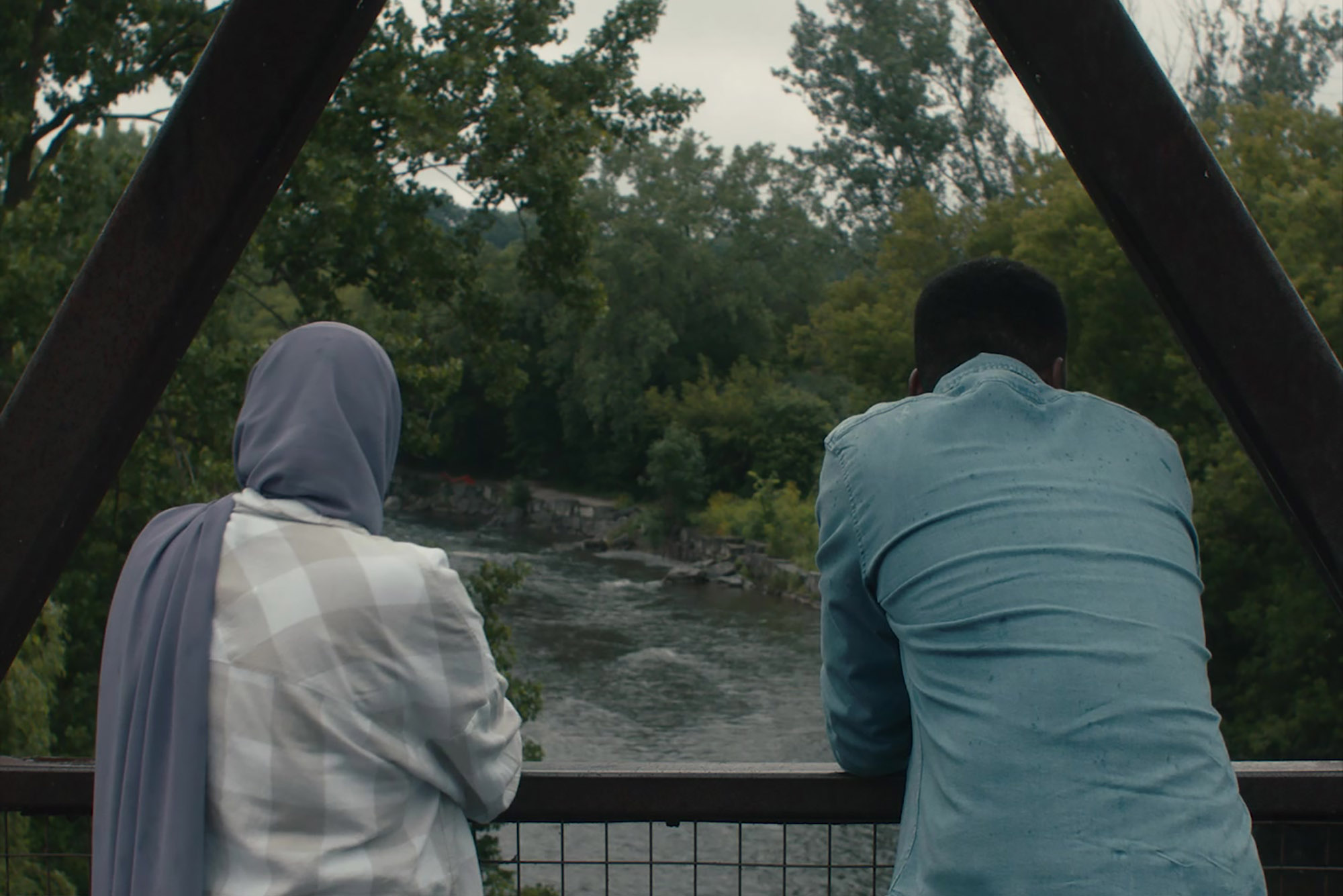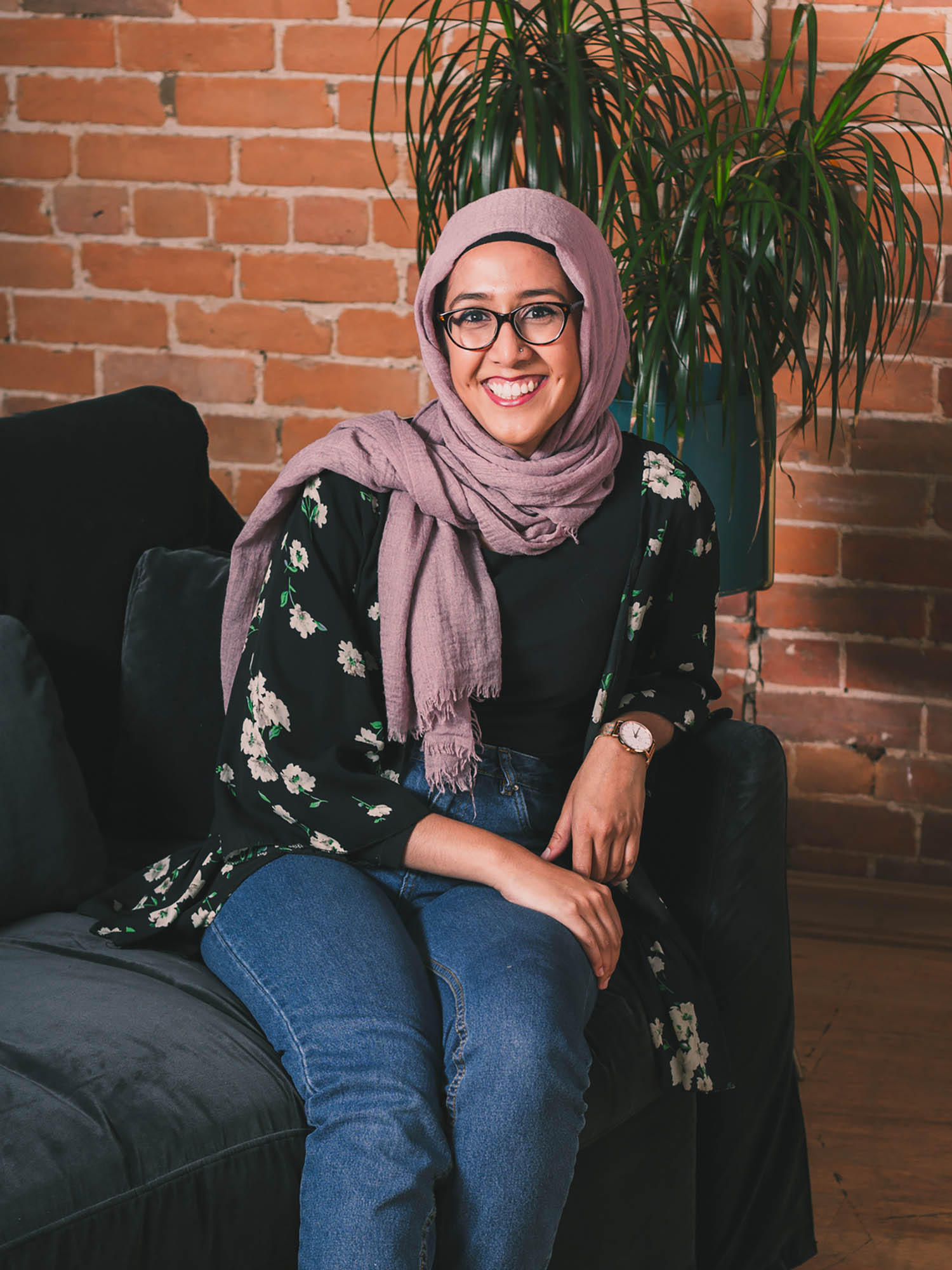Alum’s Short Tackles Mental Health in the Muslim Community

A still from the short film Taboo, written and directed by Nesa Huda (COM’22). Photo courtesy of Huda/Taboo
Alum’s Short Tackles Mental Health in the Muslim Community
Taboo is the first film from screenwriting grad Nesa Huda
Everyone says your first film is the hardest.
That’s what College of Communication screenwriting grad Nesa Huda kept hearing when she began working on her first short film, Taboo, in 2017. Now that the project is finally out in the world, she can confirm: “everyone” was right.
The process was “both very emotionally scarring and very fun,” says Huda (COM’22), laughing. “I was putting so much pressure on myself, which made me very stressed out. But it was also a lot of fun, and a huge learning experience. I have a lot of big things I learned that I would love to apply to my next short.”

Huda wrote, directed, and produced Taboo. The 14-minute film follows two friends, Naureen and Yousef, in the wake of Yousef’s suicide attempt. Suicide is considered a sin in Islam, their shared religion. Naureen and their friends and family initially struggle to understand Yousef, further alienating him from the support he needs.
Taboo was inspired by a close friend’s difficulties with mental health, Huda says. The topic isn’t always honestly discussed in the Muslim community—hence the film’s name, says Huda, who is Muslim and wears a hijab.
“It was really hard for me to [see my friend struggling] and not know how to comfort him—I had no idea what to do when someone is having a panic attack,” she recalls. “And I was like, if I don’t know, then the people in my community definitely don’t know. So, it was really important for me to write a scenario where there’s something as big as a suicide in a Muslim community and show how the community reacts and then comes together in a better way.”
Taboo first screened in March 2023 at a theater in Toronto, near Huda’s hometown. She is working on getting the film into festivals and hopes to make it available to stream by the end of the year. (Find updates about Taboo here.)
Huda recently spoke with Bostonia about filmmaking and the need for Muslim representation in Hollywood.
Q&A
Bostonia: Congrats on completing your first short film. Can you talk about how you got Taboo off the ground?
Nesa Huda: It did end up being a six-year journey. I wrote it, and then I wasn’t sure what to do with it. My mentor, screenwriter Sahar Jahani, was like, “Apply to grants with this,” because there was a big push for BIPOC writing [at the time]. I applied for a grant with the Ontario Arts Council, and they gave me a grant of $10,000. That really gave me validation, because I was like, okay, somebody believes in me, and somebody understands the story and the premise for it. After that, I got a producer on board. She was the driving force behind questions that I had in terms of how much crew there should be, how we should be breaking down the budget. She also supported me through a crowdfunding campaign. Once we got that money in place, we were ready to shoot.
We got delayed twice because of COVID, but we finally shot in the summer of 2021. Then, and now, it was really, really important to me to ensure that most, if not all, of our cast and crew are BIPOC. The Taboo set was so different from what I’ve experienced on any set here in LA. It just felt safer; I felt like there was more community, because people were able to relate to each other more. That safety was something I was craving on sets myself; sets here are still mostly white. When I started off and I was a production assistant on sets, I would always get stared at, kind of like, What is she doing here? I really wanted every single person that was on my set to not feel that way.
Bostonia: There’s a significant lack of Muslim and hijabi representation both on and off the screen in Hollywood. Why is it important for people to see not only Muslim characters, but creators, too?
Nesa Huda: [When I was younger], I had seen a lot of films where Muslim characters were terrorists or some sort of strange stereotype. American Sniper came out, where Bradley Cooper is targeting Muslims the entire film. I was seeing a lot of alarming tweets where people were like, “Time to shoot up Muslims.” Which means people were leaving theaters and feeling validated that they can [think that way.] This was one of the things that spurred me to go into film. I was like, well, okay, there aren’t any Muslims in the industry to be correcting this.
I think what people don’t realize is that the media is such a huge agent of change. [If movies like American Sniper] are the only types of films that we see, people are just going to assume that all of us are [a certain] way, and they’re going to continue to “other” us. So that’s why it’s super, super important for us to tell stories that are different, and just show Muslims living their lives. There are so many struggles that I’ve had as a Canadian and as a Muslim growing up—if we can show those things [on screen], maybe viewers will be like, “Okay, maybe they don’t need to be associated with this kind of behavior.” I, myself, sometimes feel unsafe going out in LA. Even though I know I’m no different than anybody else around me, from the way people look at me and the hijab on my head, maybe people do feel that I’m different. I hope the next generation won’t feel othered or different. So, relatability is what I’m hoping for. That’s my goal.
Bostonia: Do you have any advice for first-time filmmakers, and particularly filmmakers of color?
I will say, I wouldn’t recommend producing and directing for your first film project. What ended up happening with me was I would be in the creative zone, working with the actors—but also be worried about the money. Like, is this over budget? Are we doing too much here? Should we not be spending this money [on these things for a scene]? I still feel like I’d love to produce, but not my own project.
The point of the matter is that we need people in this industry who look like us, and who understand our problems and issues. We need BIPOC people making more things. So, ignore all of the things that people are going to say to you—because everybody’s going to say something to you. But you need to just go out and do it. Because if you don’t, nobody else will. So, if you’re scared, just take that chance. Because it’ll pay off. If you love what you do and you’re excited and passionate about what you do, people will see that passion. They will give you grants, they will let you into their master’s programs, they will give you jobs. Yes, it can be difficult. But it’s also really beautiful. Going from having an idea in your mind, and suddenly it’s in front of you? There’s no feeling like it.

Comments & Discussion
Boston University moderates comments to facilitate an informed, substantive, civil conversation. Abusive, profane, self-promotional, misleading, incoherent or off-topic comments will be rejected. Moderators are staffed during regular business hours (EST) and can only accept comments written in English. Statistics or facts must include a citation or a link to the citation.